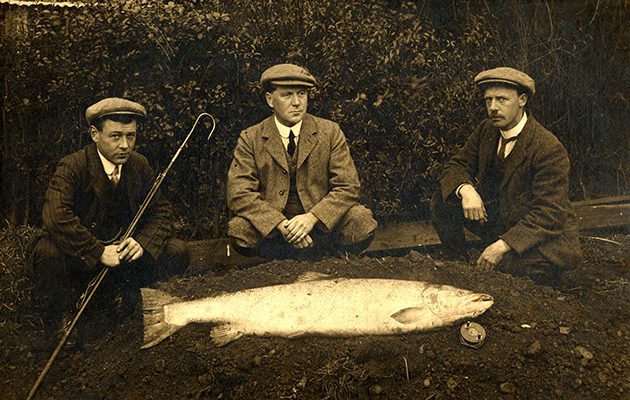The river Wye garnered a world-wide reputation for huge salmon, as well as for the intriguing cast of characters they attracted over the years, as Marsha O'Mahony explains
The world-wide reputation of the River Wye for enormous salmon has attracted a fascinating cast of characters over the years. Marsha O’Mahony tells a few of their stories.
For more on salmon fishing, follow our guide for a first-time visit to Russia, read salmon fishing in Russia: Russia for beginners.
Covering all that rural types need to know about since 1853, The Field is the ultimate sporting journal. SUBSCRIBE today and get your first six issues for JUST £6 by clicking on THIS link.
RIVER WYE
The Wye’s worldwide reputation as a salmon river is undisputed. Over time, thousands of rods have beaten a path to its banks, enticed by the promise of landing a ‘big one’. However, in the early decades of this century that certainty has receded as salmon numbers decrease. Fishermen once talked about how much their previous salmon weighed; today, it’s more likely to be how many months since they last had a pull. Nonetheless, the romance of the heady days of casting for the salmon remains strong and there is hope that numbers may increase again in the future, thanks to the huge efforts from dedicated agencies and individuals on the river.

Gillie Charlie Pocknell at Fownhope, Herefordshire.
The Wye is the fifth-longest river in the UK. It springs from its source on Plynlimon in Mid Wales and meanders some 215km along the Welsh/English border, before finally spilling into the Severn Estuary at Chepstow. Along its route, gentlemen and ladies, suited and booted in regulation tweed and leather, have cast out into Rock Pool, Dipples Pool, Bert’s Hole, Pashley’s Crib and any number of gloriously named salmon haunts, anxious for that tantalising tension on the line. The excitement never pales. It wasn’t a cheap sport and those paying good money for the privilege included royalty, world leaders, captains of industry, and many more. It is a different scene today, as it slips down the angling hierarchy. Coarse fishing has taken the lead and is proving to be of great importance to the local economy. Yet within recent memory an afternoon’s fishing on the Wye could land a rod a decent draught of salmon. It was that simple. They were that plentiful. And so were the characters in pursuit of them.
Most famous amongst them was Robert Pashley. Seventy years after his death, his name remains indelibly linked to the Wye. Described as a “gentleman of leisure”, he was dedicated to the hunt and is said to have been the most successful salmon fisherman in the history of the river, catching more than 10,000 in his lifetime. No less than 29 of these weighed in excess of 40lb, the magical portmanteau so desired by generations of rods. His best year by far was 1936, when he caught an incredible 678 salmon near his riverside home at Ross-on-Wye. Today’s salmon rods can only dream of those numbers. The total catch for 2018 was just a little more than 500.
NEVILLE CHAMBERLAIN
Beside Pashley for every fish he caught was his gillie, Jack Whittingham, a skilled and respected angler in his own right. When Pashley received a special guest in 1939, it was Whittingham who attended him on the river. Beleaguered wartime Prime Minister Neville Chamberlain was due for a spot of relaxation, and it fell to Whittingham to ensure Chamberlain had a good day’s fishing. The Prime Minister’s successful haul is immortalised in a family photograph.
Whittingham’s daughter, now in her mid-eighties and still living near her childhood home, remembers the day well. “We were sworn to secrecy when Chamberlain came to visit. Mother said we mustn’t say a word. We were even instructed to salute when he and Pashley passed in their chauffeur-driven car. I’ll never forget it.”

Jack Whittingham, Robert Pashley’s gillie.
Another event never to be forgotten took place on 13 March 1923. On this date, in the gathering darkness and after several hours of teasing and taunting, Doreen Davey, resplendent in woollen hat and dress, finally pulled her catch onto the bank at the Cowpond, Winforton. Her record-breaking – and still to be beaten – salmon weighed 59½lb and was 52½in long with a girth of 29in.
She could so easily have missed her moment in history if her mother had had her way. Davey had been urged to holiday in Biarritz with her mother, but this young woman preferred to stay home, “and hunt with the Radnor and West Hereford Hounds and catch some salmon”. She certainly did that with some style and as a result received dozens of letters of congratulations and at least one marriage proposal.
THE HATTON LEGEND
A small detail in that record catch was the 2in aluminium minnow she used, purchased from Hatton’s of Hereford. This legend of a game-fishing shop cannot be allowed to pass without mention in any piece on the River Wye. A pilgrimage for sporting fishermen, Hatton’s had a worldwide reputation. When the shop closed its doors for the last time in 2001, it was the end of an era. Certainly, those old enough to remember describe the shop and the Hatton family – Herbert, Frances Margaret, their son, John, and much-valued assistant Norman Owen – with great affection. Among the many illustrious customers to step over its threshold were some royal guests, including Edward VIII, when he was Prince of Wales, and George VI, when he was Duke of York, as well as politicians, captains of industry, gillies and many more. It was the thumping heart of salmon fishing on the Wye.
The patriarch of the business, Herbert Hatton, who died in 1955, founded the shop at the turn of the 19th century and steadily built it up into one of the best known of its kind in the world. Customers flocked from the Americas, China, Europe and the Middle East, and Hatton was a fishing consultant to some of the largest households in Britain.

Herbert and Frances Hatton. Frances, a respected angler, worked in the shop for years and even painted Herbert’s self-designed lure.
Entering the shop, one’s eyes rested on mounted salmon in glass cases, gaffs and nets propped up in corners, lures and spinners of many descriptions, including the famous Wye Devon Minnow, all laid out under glass counters, an array of rods, reels and lines. Hatton honed his craft from his own experience as a fisherman, landing 14 salmon in excess of 40lb with the Wye Devon Minnow, a lure he designed and patented in 1907. It was painted by his wife, who worked from a back room. She was a respected angler in her own right, described in contemporary reports as the “grand old lady of Hereford angling”.
Their son, John, took over the running of the shop on the death of his father and followed in the family tradition. Together with his business partner, Norman Owen, they showed great skill in rod making and became the only representatives of the fishing tackle trade in the Guild of Master Craftsmen. In the 1960s alone, the shop repaired more than 3,000 rods every year, with orders coming from all over the world. And there were many more, handcrafted, made-to-measure models. Hatton’s is missed and not forgotten.
There is no doubt Hatton’s miscellanea found its way into many of the fishing huts along the river, refuges from the sun, rain, snow and even prying eyes. Some are grand affairs, others more modest. Their walls invariably decorated with rods, nets, line, flies, waders, spinners and photos of previous catches. Many a rod has stood in the doorways of these huts, waiting for the kettle to boil, looking to the river and wondering what it held in store for him or her today.
UNUSUAL CATCH
Maybe a certain Aberedw fisherman was entertaining such thoughts as he observed the river from his hut in the 1920s. He was a rather well-known fisherman who observed certain rituals at the start of his fishing day. He was known to eat his sandwiches accompanied by a glass or two of port, no matter the time of day. He did, however, overindulge on one occasion and, when he started casting after his midday break, fell into the river, quickly turned turtle-like and floated on downstream, fortuitously buoyed up by the air in his waders. Fortunately, his gillie saw what happened, ran downstream and, with all the precision his years on the riverbank had given him, gaffed the fisherman by the seat of his waders and hauled him out like a large salmon. The gentleman was reported as unaffected by the experience and with little recollection of the trauma, thanks, one suspects, to generous glugs of port.
This particular gillie’s thoughts went unrecorded but he was most certainly the unsung hero that day. The gillie, alongside the gamekeeper, is one of country sport’s greatest figures. But, just as salmon numbers drop, so does the number of gillies. Respectful, sometimes silent, other times garrulous, their knowledge is honed from years on their beat, paying close attention to the river and the landscape, noticing changes in the environment before anyone else.

Gillie Ivor Williams with a 50lb salmon.
George Woodward is a current-day legend on the Wye. He learned his craft from a generation of gillies that came before him. Who, one wonders, will Woodward pass his knowledge on to? Meanwhile, he has already made his funeral arrangements, with instructions that he be “buried sitting up, looking over the valley to the river below, with a glass of whiskey balanced in my hand”.
Many of Woodward’s guests had accolades, awards and titles as long as their arms, but that didn’t necessarily mean they made an equal impression on the riverbank.
“I always found it amazing how you could have a man who ran a multinational company, where he could sign a piece of paper that could earn or lose millions; where he could hire and fire hundreds of people; where he’d gone up the chain of command; where he had a huge house and a chauffeur, and one day a week he’d get a fishing rod in his hands and his bloody brains would go through his backside. Unbelievable. Sometimes you would think, ‘How on earth did that
man get into the position he got into?’ It’s a great leveller.”
But Woodward wouldn’t change a thing. “Out of all the people I have fished with, and I have fished with thousands, I can only think of two I didn’t really want to be with. But I’ve also fished with an awful lot of people who had done something with their lives, for example, fighter pilots from the last war, people who fought at Arnhem, or landed in Normandy. It’s hard not to be impressed by their experiences.”
In the immortal words of HA Gilbert, author of The tale of a Wye fisherman, “I do not pretend to be an expert and these lines are written in humble spirit”, a celebration of the indomitable salmon angler. Long may we have them on the Wye.





